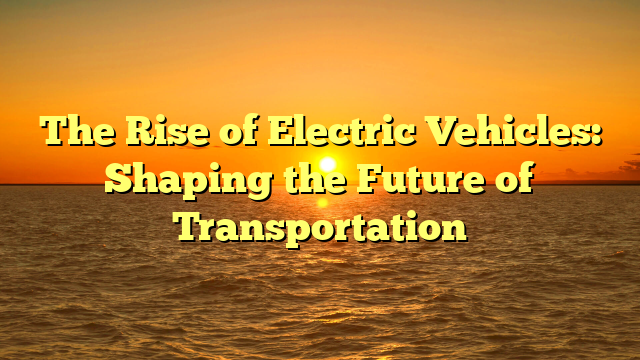In recent years, electric vehicles (EVs) have transitioned from a niche innovation to a mainstream transportation solution, reshaping how people view mobility. With concerns about climate change, rising fuel costs, and advancements in technology, EVs are becoming a preferred choice for environmentally conscious consumers and forward-thinking governments alike. This shift marks a significant step toward reducing global carbon emissions and creating a cleaner, more sustainable future.
Environmental Benefits
One of the primary advantages of EVs is their reduced environmental impact. Unlike traditional gasoline-powered cars, EVs produce no tailpipe emissions, significantly lowering air pollution in urban areas. When powered by renewable energy sources such as solar or wind, their carbon footprint becomes even smaller. This aligns with global efforts to meet climate targets and reduce dependence on fossil fuels.
Technological Advancements
The rapid improvement in battery technology has been a driving force behind the EV revolution. Modern EV batteries offer longer ranges, faster charging times, and improved durability compared to earlier models. Charging infrastructure is also gg soft expanding, with more public charging stations available in cities and along highways, making EV ownership increasingly convenient.
Economic Impact
While EVs can be more expensive upfront, the long-term savings on fuel and maintenance make them a cost-effective choice. Electric motors have fewer moving parts than internal combustion engines, resulting in lower maintenance costs. Governments in many countries also provide tax incentives and subsidies to encourage EV adoption, further offsetting initial expenses.
Challenges Ahead
Despite their growth, EVs face certain challenges, including battery recycling, the environmental impact of mining raw materials, and the need for an even more extensive charging network. Addressing these issues will be crucial to ensuring the industry’s long-term sustainability.
Conclusion
Electric vehicles represent more than just a technological advancement—they are a symbol of a global shift toward cleaner, smarter transportation. As innovation continues and adoption rates climb, EVs have the potential to become the standard mode of personal and commercial transport, paving the way for a greener and more connected world.



